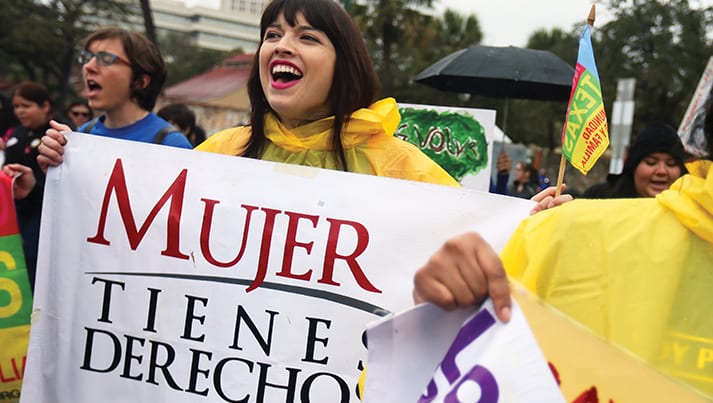A Bold Vision for Texas

A new resource aims to restore essential reproductive care to millions of underserved Texas Latinas.
If you don’t know where the Lower Rio Grande Valley in Texas is, get out a map. Trace your finger down to the southernmost point of the state where it plunges toward Mexico. Find the four counties clustered in the tip, along the border where the Rio Grande carves its jigsaw divide into the earth.
Right now, you have your finger on one of the most treacherous health crises in the United States.
Texas boasts some of the most alarming statistics in the nation surrounding women’s health care. It has the highest uninsured population of any U.S. state, and more than 20 percent of women there live in poverty. But in the rural, impoverished, primarily Latino reaches of Texas like the Rio Grande Valley, the situation is far more dire: poverty rates are twice the state average, and over half the women of reproductive age lack basic health insurance.
As detailed in a startling report published in 2013 by the Center for Reproductive Rights and the National Latina Institute for Reproductive Health (NLIRH), severe cuts to women’s preventive health services enacted by the Texas state legislature over the last four years have further devastated this region.
Limited availability of contraception and sex education has caused unintended pregnancy and sexually transmitted infection rates to swell above the national average.
A lack of accessible physicians and screening tests has permitted cervical and breast cancers to take a disproportionate toll on the population.
Restricted access to counseling, abortion services, and adequate pre- and postnatal care has left immigrants and Latinas of reproductive age largely adrift during some of their most vulnerable years.
This month, the Center and NLIRH released Nuestro Texas: A Reproductive Justice Agenda for Latinas, a blueprint of proactive policy measures to restore access to critical reproductive health services for millions of Texas Latinas and put an end to this unfolding and preventable crisis. Each member of the Texas state legislature has received a copy of the report.
“Texas can and must do better when it comes respecting and fulfilling the human rights of Latinas and their families,” says Katrina Anderson, the Center’s senior human rights counsel and one of the report’s authors. “The state’s current policies have jeopardized women’s rights to health, life, and freedom from ill treatment. This guide will help lawmakers address these violations and restore to women across Texas their fundamental right to affordable and accessible care.”
Offering “a bold vision for a better Texas,” the detailed report includes policy recommendations that would ensure
- reproductive health services in rural and underserved areas,
- safe, legal, and affordable abortion for all Texas women,
- expanded health care coverage to improve the health and well-being of all Texans, and
- protection for non-citizens’ basic human rights, including the right to health.
“We wanted to develop an agenda that addresses the comprehensive needs of Latinas throughout their sexual and reproductive lives—expanding the conversation beyond abortion and birth control to include the concerns of youth and older women, and to address the particular challenges faced by Latinas living in border communities versus urban centers,” says Anderson. “This is an ambitious, long-term vision, but the agenda also includes concrete, short-term solutions—such as increasing the capacity of community health workers to reach Latinas in very rural areas—that could help pave the road toward that goal.”
In addition to publishing the agenda, the Center and NLIRH are also mobilizing a campaign with local and national networks to further promote these policy initiatives. On February 10, NLIRH’s Texas Latina Advocacy Network will host a Lobby Day and a briefing on the policy blueprint at the Texas State Legislature to build support for the agenda.
All across the Rio Grande Valley, women have become highly organized and energized in the fight to defend their reproductive rights and build stronger families and communities. We are excited to engage and support them in these efforts. On March 8-9, we will hold a hearing in the Rio Grande Valley on women’s rights issues, along with a community march and rally in honor of International Women’s Day and a human rights training session. To learn more about the hearing and register to attend, visit the Nuestro Texas campaign website.
Show your support. Endorse the Nuestro Texas blueprint for action.
